|
|
The Holy and Great Martyr Procopius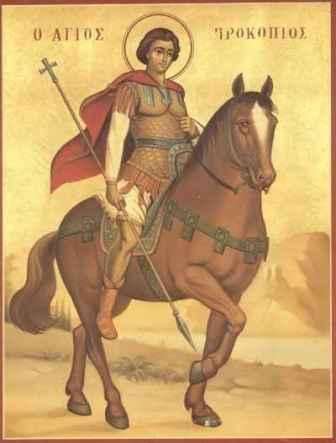 He was born in Jerusalem of a Christian father and a pagan mother, at first bearing the name Neanias. After his father's death, his mother brought him up entirely in the spirit of Roman idolatry. When he had grown up, the Emperor Diocletian saw him at some time and was so pleased with him that he took him to court to serve in the army. When this wicked Emperor launched a persecution of Christians, he ordered Neanias to go with a detachment of soldiers to Alexandria and exterminate the Christians there. But, on the road, there happened to Neanias something similar to that which happened to Saul. At three o'clock in the morning there was a violent earthquake, the Lord Jesus appearing to him and saying: 'Neanias, where are you going, and against whom are you rebelling?' In great fear, Neanias replied: 'Who are you, Lord? I cannot recognise You.' Then a brilliant Cross, as of crystal, appeared in the sky and a voice came from the Cross: 'I am Jesus, the crucified Son of God.' The Lord went on: 'By this sign that you have seen, overcome your enemies, and My peace will be with you.' This event utterly changed Neanias's life. He caused a cross such as he had seen to be made, and, instead of moving against the Christians, set off with his soldiers against the Agarians, who were attacking Jerusalem. He entered Jerusalem victorious and told his mother that he was a Christian. Brought to trial, he took off his army belt and sword and cast them before the judge, demonstrating by this that he was a soldier only of Christ the King. After harsh torture, he was thrown into prison. There Christ the Lord appeared to him again, baptising him and giving him the name Procopius. One day twelve women came to the window of his cell and said to him: 'We also are the servants of Christ.' Arrested for this, they were thrown into the same prison, where St Procopius instructed them in the Christian faith and carefully prepared them to receive the crown of martyrdom.* These twelve women were then harshly tortured. Beholding their sufferings and courage, Procopius's mother also came to faith in Christ, and then all thirteen were put to death. When St Procopius was led to the scaffold, he raised his hands towards the East and prayed to God for all the poor and needy, the destitute and the widowed, and especially for the holy Church, that it might grow and spread and that Orthodoxy might shine to the end of time. He was assured from heaven that his prayer was heard, after which he joyfully laid his head under the sword and went to his Lord, to eternal joy. St Procopius suffered with honour in Palestinian Caesarea, and was crowned with an eternal wreath of glory, on July 8th, 303.
*Author's note: Therefore those in the married state ('crowned'), invoke St Procopius, together with the God-crowned Constantine and Helena. He was born in Jerusalem of a Christian father and a pagan mother, at first bearing the name Neanias. After his father's death, his mother brought him up entirely in the spirit of Roman idolatry. When he had grown up, the Emperor Diocletian saw him at some time and was so pleased with him that he took him to court to serve in the army. When this wicked Emperor launched a persecution of Christians, he ordered Neanias to go with a detachment of soldiers to Alexandria and exterminate the Christians there. But, on the road, there happened to Neanias something similar to that which happened to Saul. At three o'clock in the morning there was a violent earthquake, the Lord Jesus appearing to him and saying: 'Neanias, where are you going, and against whom are you rebelling?' In great fear, Neanias replied: 'Who are you, Lord? I cannot recognise You.' Then a brilliant Cross, as of crystal, appeared in the sky and a voice came from the Cross: 'I am Jesus, the crucified Son of God.' The Lord went on: 'By this sign that you have seen, overcome your enemies, and My peace will be with you.' This event utterly changed Neanias's life. He caused a cross such as he had seen to be made, and, instead of moving against the Christians, set off with his soldiers against the Agarians, who were attacking Jerusalem. He entered Jerusalem victorious and told his mother that he was a Christian. Brought to trial, he took off his army belt and sword and cast them before the judge, demonstrating by this that he was a soldier only of Christ the King. After harsh torture, he was thrown into prison. There Christ the Lord appeared to him again, baptising him and giving him the name Procopius. One day twelve women came to the window of his cell and said to him: 'We also are the servants of Christ.' Arrested for this, they were thrown into the same prison, where St Procopius instructed them in the Christian faith and carefully prepared them to receive the crown of martyrdom.* These twelve women were then harshly tortured. Beholding their sufferings and courage, Procopius's mother also came to faith in Christ, and then all thirteen were put to death. When St Procopius was led to the scaffold, he raised his hands towards the East and prayed to God for all the poor and needy, the destitute and the widowed, and especially for the holy Church, that it might grow and spread and that Orthodoxy might shine to the end of time. He was assured from heaven that his prayer was heard, after which he joyfully laid his head under the sword and went to his Lord, to eternal joy. St Procopius suffered with honour in Palestinian Caesarea, and was crowned with an eternal wreath of glory, on July 8th, 303.
*Author's note: Therefore those in the married state ('crowned'), invoke St Procopius, together with the God-crowned Constantine and Helena.St Procopius the Fool for Christ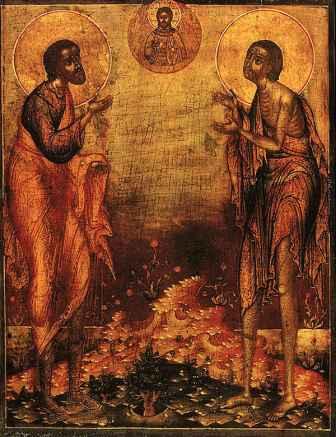 A wonderworker of Ustiug, who died in 1303, he was of German origin and was a well-known merchant. Arriving in Novgorod in the course of his work, he was entranced by the beauty of Orthodoxy and embraced the Orthodox faith. He desired to be a perfect Christian, to which end he gave away all his goods to the poor and exercised himself in the practice of all the other virtues. He affected madness to avoid the praise of men, had insight into their hearts and destinies and was also able to predict natural occurrences. By his tearful prayers before the icon of the most holy Mother of God, he stopped a terrible hailstorm over the town of Ustiug, and thus brought the sinful town to repentance. His dead body was found in the road, covered with snow. A church was built over his wonderworking relics. A wonderworker of Ustiug, who died in 1303, he was of German origin and was a well-known merchant. Arriving in Novgorod in the course of his work, he was entranced by the beauty of Orthodoxy and embraced the Orthodox faith. He desired to be a perfect Christian, to which end he gave away all his goods to the poor and exercised himself in the practice of all the other virtues. He affected madness to avoid the praise of men, had insight into their hearts and destinies and was also able to predict natural occurrences. By his tearful prayers before the icon of the most holy Mother of God, he stopped a terrible hailstorm over the town of Ustiug, and thus brought the sinful town to repentance. His dead body was found in the road, covered with snow. A church was built over his wonderworking relics.Our Holy Father Theophilus the Outpourer of Myrrh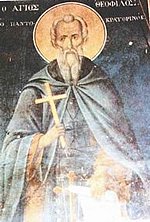 A Macedonian by birth, from the village of Ziki, he was a very learned man and a great ascetic. By order of Patriarch Niphon of Constantinople, he travelled to Alexandria to ascertain whether it was true that Patriarch Joachim could move mountains and drink poison without harm, being driven to this by the Jews and Moslems. Convinced of the truth of these marvels, Theophilus returned to the Holy Mountain, where he lived in asceticism first at Vatopedi, then at Iviron and finally in St Basil's cell near Karyes. Urged to accept the archbishopric of Salonica, this holy man refused. Through profound silence, meditation and heartfelt prayer, he succeeded in purifying his mind from all passionate thoughts, and thus became a pure vessel of the Holy Spirit, indwelt by Christ. At the time of his death, he ordered his disciple, Isaac, not to bury him when he was dead but to tie a cord round his feet and drag him away to a nearby stream, and there throw him in. With great fear, the disciple did this. But, by the providence of God, St Theophilus's relics were discovered and, when they were taken to his cell, a miraculous myrrh began to flow from them. He entered into rest on July 8th, 1548. A Macedonian by birth, from the village of Ziki, he was a very learned man and a great ascetic. By order of Patriarch Niphon of Constantinople, he travelled to Alexandria to ascertain whether it was true that Patriarch Joachim could move mountains and drink poison without harm, being driven to this by the Jews and Moslems. Convinced of the truth of these marvels, Theophilus returned to the Holy Mountain, where he lived in asceticism first at Vatopedi, then at Iviron and finally in St Basil's cell near Karyes. Urged to accept the archbishopric of Salonica, this holy man refused. Through profound silence, meditation and heartfelt prayer, he succeeded in purifying his mind from all passionate thoughts, and thus became a pure vessel of the Holy Spirit, indwelt by Christ. At the time of his death, he ordered his disciple, Isaac, not to bury him when he was dead but to tie a cord round his feet and drag him away to a nearby stream, and there throw him in. With great fear, the disciple did this. But, by the providence of God, St Theophilus's relics were discovered and, when they were taken to his cell, a miraculous myrrh began to flow from them. He entered into rest on July 8th, 1548.Martyr TheodosiaMother of Great-martyr Procopius
Appearance of the "Kazan" Icon of the Most Holy Theotokos (1579)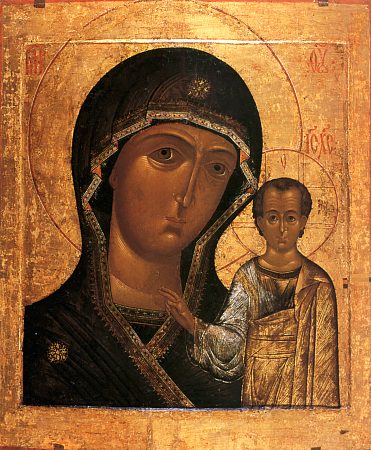 The Appearance of the Icon of the MostHoly Mother of God in the City of Kazan (1579): On 1 October 1552, on the feastday of the Pokrov-Protection of the MostHoly Mother of God, at night, tsar Ivan IV in heading the Russian forces made ready for a decisive assault against the Tatar city of Kazan, and suddenly he heard the peeling of the Moscow bells. The tsar realised that this was a sign of the mercy of God: that through the prayers of the mighty commander-in-chief, the Lord deigned that the Kazan people should be converted to Him... The Appearance of the Icon of the MostHoly Mother of God in the City of Kazan (1579): On 1 October 1552, on the feastday of the Pokrov-Protection of the MostHoly Mother of God, at night, tsar Ivan IV in heading the Russian forces made ready for a decisive assault against the Tatar city of Kazan, and suddenly he heard the peeling of the Moscow bells. The tsar realised that this was a sign of the mercy of God: that through the prayers of the mighty commander-in-chief, the Lord deigned that the Kazan people should be converted to Him...New Martyr Anastasius at Constantinople (1743)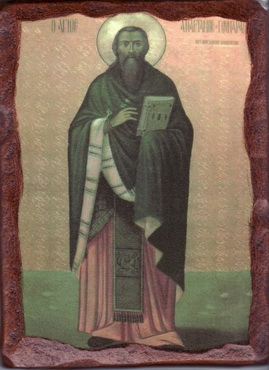 Born in Janina, a parish hieromonk of a suburban church near Constantinople, he was decapitated in 1743 by the Turks for his confession of Christ and censure by Islam. Born in Janina, a parish hieromonk of a suburban church near Constantinople, he was decapitated in 1743 by the Turks for his confession of Christ and censure by Islam.St. Procopius, fool-for-Christ, wonderworker of Ustiug (Vologda) (1303)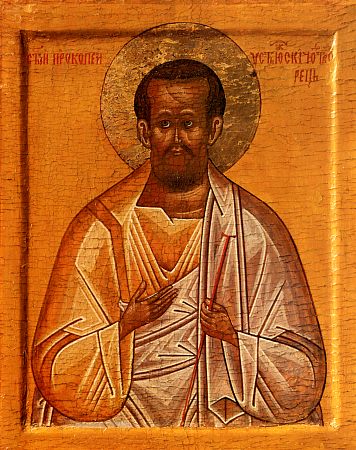 He was a foreign merchant and was engaged in trade in Novgorod. Captivated by Orthodox worship and "the divine teaching" of the Holy Orthodox faith, he accepted Orthodoxy, distributed "his demanding riches", scorned worldly vanity and, "by shining piety", became a monk in the monastery of the Venerable Barlaam of Khutinsk. Avoiding popularity, he then withdrew from the city of Ustiug, selected here the "turbulent and, according to the apostle, foolish way of life," and was the first fool for Christ in Russia... He was a foreign merchant and was engaged in trade in Novgorod. Captivated by Orthodox worship and "the divine teaching" of the Holy Orthodox faith, he accepted Orthodoxy, distributed "his demanding riches", scorned worldly vanity and, "by shining piety", became a monk in the monastery of the Venerable Barlaam of Khutinsk. Avoiding popularity, he then withdrew from the city of Ustiug, selected here the "turbulent and, according to the apostle, foolish way of life," and was the first fool for Christ in Russia...Royal Martyr Mirdat, King of Kartli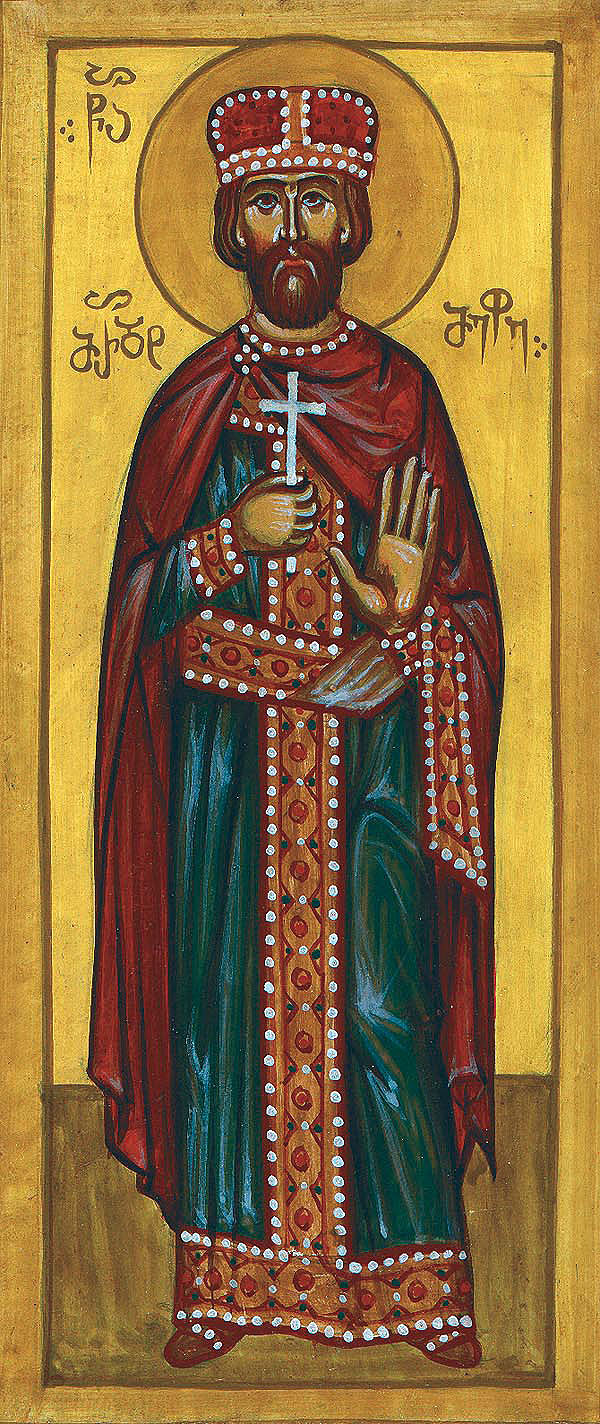 King Mirdat (408-410), the son of Varaz-Bakur, was the first martyred king of Georgia. He was raised by his maternal grandfather, King Trdat.The faithful grandfather taught the future king to love God and his nation, and the young prince mindfully preserved his grandfather’s wisdom throughout his life. Mirdat was endowed with the greatest of a nobleman’s virtues: wisdom, discretion, physical prowess, fearlessness, valor, and courage. He liberated Klarjeti from the Byzantines, abolished the tribute system (by which Georgia was required to pay taxes to Persia), and prepared for war against the Persians... King Mirdat (408-410), the son of Varaz-Bakur, was the first martyred king of Georgia. He was raised by his maternal grandfather, King Trdat.The faithful grandfather taught the future king to love God and his nation, and the young prince mindfully preserved his grandfather’s wisdom throughout his life. Mirdat was endowed with the greatest of a nobleman’s virtues: wisdom, discretion, physical prowess, fearlessness, valor, and courage. He liberated Klarjeti from the Byzantines, abolished the tribute system (by which Georgia was required to pay taxes to Persia), and prepared for war against the Persians... |